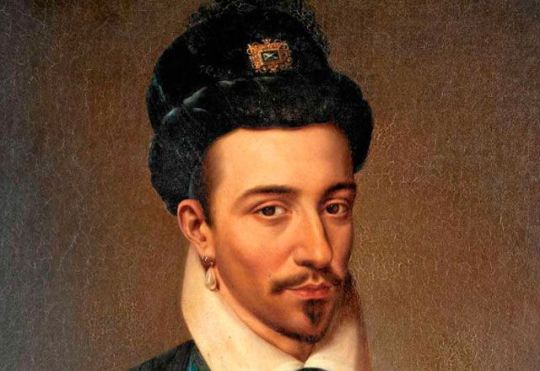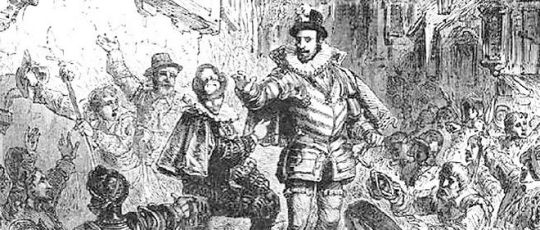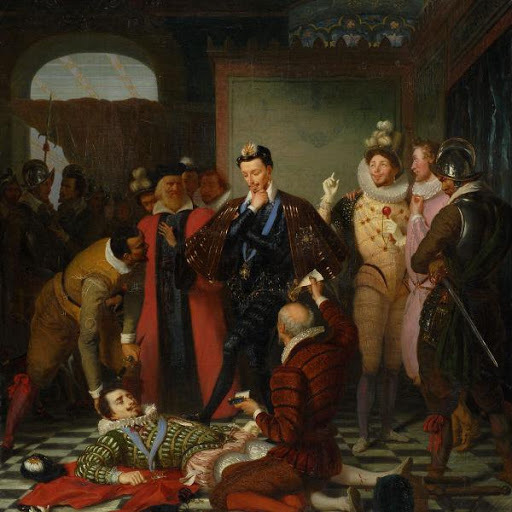#la princesse de Clèves was also good
Explore tagged Tumblr posts
Text
Silly question I wanted to ask: what's a piece of literature you studied in middle school/high school that you thought was going to be boring, but was actually fascinating?
For me it was "Dom Juan ou le festin de pierre" (i think that the name) by Molière. Just the build up from Dom Juan being a flirty bastard to him being sent to hell after commiting to many offences is honestly awesome.
#la princesse de Clèves was also good#its about a woman who got married to some guy she didn't really love but then fall madly in love with another man#but because she wants to keep her virtue#she ignores him#even after her husband's death and becomes a nun so she's no longer tempted by this man#it was quite a hard read because old french is a pain in the ass to read#but it was quite nice!
4 notes
·
View notes
Text
Henri III deserves better than his reputation.
@microcosme11 who was interested in knowing more about Henri III.
***
Henri III was the last Valois king of France (19/09/1551-02/08/1589) and certainly among the kings whose reputation was the most tarnished. You could say it was trashed by the black legend his enemies quickly wove around him: weak, effeminate, cowardly, treacherous, immoral... This is how he was depicted for centuries. For decades now, however, historians have worked to rediscover a misjudged king and rehabilitated a complex personality who was at odds, in many ways, with the expectations of his century. Henri III had above all a high idea of royal authority, and a modern conception of the state. In particularly difficult circumstances, he managed to avoid the wreck of the monarchy.

This post will try to be a quick summary of the circumstances of his reign, of his real qualities and personality, of the origin of the "black legend", and of his legacy as a king.
When the future Henri III was born, he wasn't destined for a crown. He was indeed the fourth son of Henri II and Catherine de Medici. Titled Duke of Anjou, he was given a thorough and refined education, as befitted a true prince of the Renaissance. His master Amyot, the most reputed of his time, was able to cultivate qualities that would make Henri a brilliant and eloquent prince " one of the best speakers of his era."
Henri was also Catherine's favorite child. He was good looking, smart, fashionable, an excellent swordsman. Aged only 16, he became Lieutenant General of the Kingdom, and he would soon prove his valor in the battlefield in Jarnac and Moncontour. Elected King of Poland and Grand Duke of Lituania under the name Henryk Walezy, his reign wouldn't last long - his brother Charles IX died without an heir and Henri immediately left Poland for France.
He was crowned on February 13, 1575, and two days later married the beautiful and smart Louise de Vaudémont, a princess of Lorraine, close to the famous and very influent House of Guise.

France was then in a very difficult situation. The Kingdom was divided and devastated by the wars of Religion. The warring parties were backed by foreign powers and France's political and economical condition suffered.
In the late XVIth century, the great lords of the Kingdom still acted like sovereigns of their own in many ways - the feudal order hadn't yet given way to the future absolutism (which would be the later creation of Richelieu and Louis XIII IMHO, in reaction precisely to the Great Lords' excessive capacity for nuisance). Henri III couldn't afford to overtly dismiss or displease them.
He had to stand up to three main parties: the Malcontents, the Protestants (leader: Henri, King of Navarre, his distant cousin), and the Catholics (led by the House of Guise). He knew that the restoration of peace and concord meant he had to get into everybody's good graces- a perilous proposition in such times. His whole life, Henri would have to find a balance. Nobody would be grateful for that. Mindful of his duty and his role as a mediator in the kingdom, he worked to establish the royal authority as effectively sovereign.
He would find enemies everywhere.
He was well spoken, soft spoken, elegant and well mannered: he would be mocked as weak and effeminate. He was clever and always favored diplomacy over shows of brute force: he would be despised for it and depicted as an immoral, cowardly prince. He wasn't as easily accessible as his predecessors: the Great lords didn't like that. When he got closer to the Guise, to appease the most radical Catholics, the Protestants rebelled. When he leaned towards Henri de Navarre, the League reacted violently. The balancing act harmed his reputation.
With the help of his ever present mother Catherine, he initiated a rapprochement with Henri de Navarre while supporting his brother's (François, Duke of Alençon) plans in the Spanish Netherlands: Protestants and Catholics coming together to face a common enemy (the Habsburgs) ? Excellent. That's a lesson Henri IV would remember.
Henri III was, in spite of his rather frail health, a hard worker. In 1584, after seven years of relative peace, strenghtening of the royal authority, and an intense legislative work, he was still childless - and his brother and heir François d'Alençon died of tuberculosis.
This was a great upset in the game.
Because the new heir was Henri de Navarre - leader of the Protestant party. Which of course was unacceptable for the Catholic opinion. Paris, who chose the Ligue, was dangerously agitated.
What a stroke of luck for Henri de Guise!

What was named then "La Guerre des Trois Henri" opposed three parties, not two. Although he was apparently allied to the ultra Catholics Guise, Henri III took care not to burn his bridges with the Protestants. The Habsburg support of Henri de Guise wasn't to his taste, and he didn't like the ambitious Duke. And if Navarre (whom he esteemed) was to lose entirely, Guise would become too powerful.
Guise was the first to move; exasperated by the King's caution, the Duke entered Paris in open defiance of the King, with the population cheering him on. Fearing a coup d'Etat, the King sent his own troops to Paris, and what happened was the famous "Journée des Barricades" (Barricade Day), on 13 May 1588.
What happened next ? Henri III took a terrible decision: for the peace of the Kingdom, for France to subsist as a State, for his authority to be maintained, Henri de Guise was to disappear. And there was a way to lure him: afraid that the King would sign peace with Navarre, Henri de Guise went to negotiate with Henri III in Blois. On December 23, Henri III had Henri de Guise assassinated by his own Guard, as well as his brother the Cardinal de Lorraine.

Was the King's opinion and attitude unclear before ? That's cleared now. But as for peace ? Never. The powerful Ligue lashed out in rage . The hatred was open. There were outloud calls of Death to the Tyrant.
Henri III would never see the Ligue destroyed: on the 1st August 1589, a fanatic monk by the name of Jacques Clément would stab him to death.

"This King was a good prince, if he'd met a better century", would write the chronicler Pierre de l'Estoile upon his death. In spite of his peculiar personality and the outburst of hatred he aroused, Henri also showed his qualities.
He had been raised in a humanist background and would protect the world of literature (Montaigne, Du Perron, Desportes); he was rather to be found working in his office with his ministers rather than on the battlefield. Although, when he had to, he was steadfast and brave in battle.
He was smart and usually able of compassion towards his adversaries.
He had faith, and his misfortunes made him find a refuge there. We know he even went on a spiritual retreat into a monastery for a while.
His contemporaries described him as a man who loved women - which was overlooked because he never granted any of his lovers a title of official mistress. He had for Marie de Clèves, Princess of Condé, a platonic, but deep passion, and the depth of his mourning after she brutally passed away in 1574, stunned the Court.
He married Louise de Vaudémont for her charm and her wit rather than for politics.
But in spite of this, the image we've had of him for centuries is indissociable from his "mignons" - effeminate youths clad in excentric outfits and wasting their time in frivolous games. He was painted as homosexual (and therefore despicable) based on pamphlets written by radical leaguers, radical calvinists, Malcontents. The high nobility didn't appreciate his "new ways", the refining of clothes and manners, the new court practices. The Ligue used against him a virulent propaganda, along with calls to rebellion and real campaigns of calumnies. And when he died, the change of dynasty didn't allow for a better, more impartial image to be offered. Queen Louise and the Duchess of Angoulême tried in vain to dispell this ambiguous image. The real culprits were'nt even be punished (Jacques Clément however perished).
And yet. He was the one who wanted concord and national unity in a country torn by wars of religion (he lived four of them). His long and unthanked political action allowed Henri IV to end half a century of cruel civil war.
Was he weak ? It is true he bowed to the many pressures of the Great lords. But he always took back control.
Cowardly ? He wasn't vainglorious. And he proved his personal courage, in the battlefields of his youth as well as at the time of his death (he fought off his killer).
Frivolous and immoral ? He loved pleasures, arts, and feasts. But he also was anxious about his soul and salute.
In the difficulties he had to face, he managed to rule and to leave France a considerable legislative body of work (Code Henri III).
What are some positive aspects of his reign ?
He launched loans to stabilize finances, he reduced the taille (tax), ensured the protection of cities, created offices, taxed luxury, taxed the clergy, revived the textile industry, revised farm leases, created fines for fraudsters, created a body of health officers and an assistance service for the needy and the orphans; he undertook the administrative reorganization of the kingdom, maintained the unity of France by overcoming the worst of wars, both civil and religious, and retained royal legitimacy through a regular transmission of power to Henri IV.
He held on his principle of royal authority and modern conception of the State. He maintained.
I agree with Pierre de l’Estoile.

“Décrié”: condemned, castigated, reviled.
Sources:
Wikipedia
https///www.histoire-pour-tous.fr/histoire-de-france/1481-henri-iii-le-dernier-des-valois.html
Pierre Chevallier: Henri III, roi shakespearien, 1985
Michel Pernot : Henri III, le roi décrié, 2017
Jean-François Solnon: Henri III: un désir de majesté, 2001
#my posts#xvi#henri iii#i'm not a historian#of course i'm far from telling everything this is just a quick defense of a man who deserves better than this sordid notoriety#i'm not saying he was flawless either#but for once he can get some credit#thanks @microcosme11
29 notes
·
View notes
Text
Prompted by something that @pioup-pioup said, I give you:
Suggestions on when to read some classics:
The Gambler : January
Orlando Furioso: in summer or possibly spring
Persuasion: This is a summerish book, ideally to be read in June or July. September is also acceptable, especially if it rains, but August is probably way too hot.
Middlemarch: spring or autumn, when the weather is mild. Ideally it should feel like a very good Tuesday, when you still feel you can get a lot accomplished in the week
La Vita Nuova: as close to easter as you can
Zorrilla's Don Juan in June, But!!
Tirso's Don Juan in August
I don't have a strong opinion on Byron's or Molière's
La princesse de Clèves: winter
Madame Bovary: also winter but preferably not the holidays
3 notes
·
View notes
Text
Great female authors in litterature
So this morning I was watching a YouTube video and I made the fatal mistake of going to read the comments, in which I found this little horror:
Person A: If you never read a book by a man again, you're actually never going to read a book ever, and honestly you're missing out.
Person B: you heard it here first folks, there are no women who write books :)
Person A: Sorry I meant good book, I just kinda assumed you wouldn't willingly read a bad book. If you're gonna read you're gonna read the good ones
At first I was really pissed, but then I thought it was useless to get angry at some prick on the internet who has probably never read more than a few books in his life.
So I decided to make this a happy occasion instead, by listing my favorite female authors of all times!
There are a few, as you’ll see, so just relax and enjoy, I hope this post brings joy to your day! :)

Madame de La Fayette - La Princesse de Clèves (1678)
Jane Austen - Pride and Prejudice (1813)
Mary Shelley - Frankenstein (1818) And this book is considered the first science-fiction book so yeah, a woman invited sci-fi
Charlotte Brontë - Jane Eyre (1847)
Luisa May Alcott - Little Women (1868)
Colette - Chéri (1920), le Blé en herbe (1923) and Gigi (1944)
Virginia Woolf - Mrs Dalloway (1925)
Agatha Christie - Every single mystery novel she wrote, but particularly Murder on the Orient Express (1934) and And Then There Were None (1939), these books blew my mind when I read them
Marguerite Duras - Un barrage contre le pacifique (1950)
Harper Lee - To kill a mockingbird (1960)
Simone de Beauvoir - La femme rompue (1967)
Maya Angelou - I know why the caged bird sings (1969)
Ursula K. Le Guin - The Earthsea series (1977 - 2005)
Alice Walker - The Color Purple (1982)
Margaret Artwood - The Handmaid’s Tale (1985)
JK Rowling - The Harry Potter series (1997 - 2007)
Chimamanda Ngozi Aichie - Half of a Yellow Sun (2006)
Suzanne Collins - The Hunger Games series (2008 - 2010)
Stephenie Meyer - The Host (2008)
Kathryn Stockett - The Help (2009)
Sarah J Maas - The Throne of Glass series (2012 - ?) and the A Court of Thorns and Roses series (2015 - ?)
Leigh Bardugo - The Six of Crows duology (2015 - 2016) also, she recently announced that she might write a third book in the undetermined future, I’m so hyped about this!
Those are just the few that popped up in my head when I read the comment, feel free to add more!!!!
If you want to read my other thoughts on stuff
#reading#amazing authors#female authors#i won't fall for this male entitlement bullshit#celebration of women writing#i classified them by year of publication because i can't chose which i like best#also i'm sure i forgot some authors that i love#that's just a sneak peak of women in litterature#there are all kind of styles in this list#positivity post#my two cents#my thoughts on stuff
11 notes
·
View notes
Text
dissecting my emotions on the second day of school
I am growing rapidly. “No one warns you about the amount of mourning in growth” who said that? Anyone know? Please let me know if you do. I can feel my boundaries expanding and my limits being pushed. It is usually a good thing, but I mourn. And feel all the other things that come with growing.
Proud: it’s impressive what I do. I feel I am truly dedicated to living an honest, present life and I fight many battles to say that. I don’t think I’ve achieved anything nor do I live in a such a way all the time, but I actively think to and push for that. School is hard and takes so much. I’m proud I go.
Interested: my subjects seem interesting and I am excited to learn where it takes me. There are a lot of possibilities. See: Eager
Love: a boy sat next to me in the library today and read the paper. I read La Princesse de Clèves. We didn’t speak although neither of us had headphones in. We exchanged smiles as I left.
Tired: this is obvious–I'm sleepy. I’m tired of exerting energy.
Failure: see: Afraid
Overwhelmed: the first days of school are so much information and questioning whether I’ll be able to do it all. My classes are all reading and writing. A Lot. Ten page research paper on Shakespeare? Shit! Critical responses to every play! Damn! I’m nervous.
Eager: In all these things, I can see the importance and the relevance to my life. I’m eager for my life to get further along. I want to see how this ends; if I manage to pull it all off. If I write these papers, if I do these presentations. But also eager to graduate and get a job and move to Pilsen or the West Loop with Austin. I’m eager for what’s to come but I’m afraid of the work. I’m eager to keep going.
Afraid: to go is one thing, I will inevitable move forward but I’m so afraid of the work I have to put in. Everything I just said, is permeated by a layer of fear. Doubt in myself, fear for what I must do. Afraid I’m not who I think I am. Afraid that “I” am not able. I understand everything thus far goes against this fear; I’ve done it. I feel my fear’s irrational but I continue to allow it to lie and contaminate my other emotions. My resolution is to live without fear. I recognize it.
#list#haha#I think it's a good exercise to list my emotions#and then talk about them#it makes them real and important#and not as scary#college is so much!!!!!
2 notes
·
View notes
Text
Also, we're talking about movies here, but what about tv shows? What about books?
When Racine writes Bérénice, and nothing happens, it's just characters being sad and tormented : it's a character-driven story. Balzac wrote character-driven stories, even Victor Hugo to some extent, I mean...
(Don't get me started about Proust)
And I know, historically, 'psychological novels', in France at least, as La Princesse de Clèves, used to be associated with feminity - as a way to criticize it, 'it's women's literature' etc it changed over the centuries! (Cf Balzac and co).
What about greek tragedies? Women wasn't allowed to act or write, can we really say Sophocle didn't try to paint the psychology of Antigone? What about Medea by Euripide? Agamemnon?
Tbh i do think it's nonsense to oppose character-driven stories and idk plot-driven stories i guess, lot of (good) stories do both, and the plot helps the psychology of the characters and vice versa.
Just saw a post saying that women prefer movies/books etc where its more about the development of the characters and less about the story itself (and this person quotes Birds of Prey) and ????? Do they ???? I do love a good story ??? What kind of generalization is that ???
#dont apologize its great#idk war movies so its very interesting#i heard its the same about 1917#again sorry for my clumsy english
53 notes
·
View notes
Text
This month’s quote was chosen one hundred percent because October is not my favorite month of the year. For me, it’s when things start getting really cold. It’s Halloween, which isn’t my favorite holiday by any means. It’s also when The Nightmare Before Christmas–a movie I happen to hate��crops up. Granted, there are good things about October. Hocus Pocus, for example, is amazing. But as far as I go, October is kind of a different world from mine. And it only took me 10 days into November to get this posted!
October kind of sucked for me, both in reading and reviewing. I only managed 11 reviews and read only 20 books. It’s a pretty small number for me considering how much I’ve managed to do in the past. I’m not really sure what it is about October that left me so busy and unable to keep up, but hopefully, it won’t carry over into November. As I speak, though, my slump hasn’t quite passed yer.
If you’ve been here for a while, it should come as no surprise that October’s best read was The Navigator by Erin Michelle Sky and Steven Brown. I’ve been raving about The Wendy for over a year now and naturally, I loved its sequel. If you’ve not picked up either book thus far, I would highly suggest that you do!
I Love You Like No Otter [Sydney Hanson]
Bezkamp [Samuel Sattin]
An ABC of Equality [Chana Ginelle Ewing]
Half-Blood [Hubert Boulard]
What I Like About You [Marisa Kanter]
House of Salt and Sorrows [Erin A. Craig]
The Princess of Clèves [Madame De La Fayette / Catel and Claire Bouilhac]
The Weaver [Heather Kindt]
Wicked Saints [Emily A. Duncan]
Nothing Special (S1) [Katie Cook]
Nothing Special (S2) [Katie Cook]
| Instagram | Twitter | Goodreads | Bloglovin’ | Facebook |
October is a Foreign Country; They do Things Differently There. #bookblogs #bookbloggers October Wrap-Up This month's quote was chosen one hundred percent because October is not my favorite month of the year.
#amreading#april readalong#author#authors#book#book blog#book blogger#book blogger tag#book bloggers#book blogs#book readalong#book review#book reviewer#book reviews#bookblog#bookblogger#bookbloggers#bookblogs#bookish#bookreview#bookreviewer#bookreviews#books#bookshelf#bookshelves#currently reading#diversity in ya#e-reader#e-readers#fox reading
0 notes